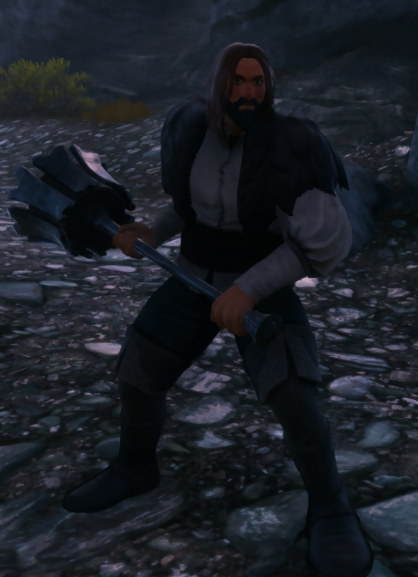
Short, stout, and stocky, Dwarves, or Dwergar as they name themselves, are well known for their proficiency as smiths and miners, as well as their almost comical stubbornness. Their craftsmanship is renowned and envied, even among elves, inscribing weaponry and amulets with enchanting runes and warding incantations, metal forged by dwarves never withers, jewels do not lose their luster, and blades never dull. They usually make their abodes in mountainous regions, not so often living underground as is commonly believed, they raise impressive stone keeps in valleys or huddled into cliffsides. Though they are stubborn, and less inclined towards adventure into the outside world, there are yet a few of their kind who find themselves stricken by wanderlust, taking to a life on the road as wandering craftsmen, itinerant clergy of Athor-Wô, or fierce mercenaries. Though they have a fairly cordial relation to most races, they are inherently distrustful of outsiders, and they consider elves, in particular, to be snotty and impractical.
Dwergar are, as their namesake implies, quite short, and were it not for their stocky, muscular builds, or impressive beards, they could easily be mistaken for human children at a distance, a mistake few ever make, as their cumbersome gait and broad builds are a sure giveaway of their nature. Males tend to favor large, well-groomed beards, something they take great pride in. Female Dwergar, though lacking beards, are just as stockily built as males, tending to be fairly muscular and stout in appearance. For dress, they often prefer durable materials, such as leathers, furs, or metal inlaid jackets and doublets, the quality of the craftsmanship often a way of displaying rank or social standing. Warriors prefer angular plate armor, broad steel skullcaps, and thick, oak shields, in addition to sharp, rune-engraved war axes.
Dwergar base their society around the clan unit, wherein multiple families can trace their origins back to a common ancestor, usually, some figure that becomes nearly revered as a demi-god or legendary hero in its own right. At the head of each clan sits a senior figure, usually male, who makes decisions and decrees based on a council of elders or esteemed members of his clan. Clan leaders, in turn, form a moot to elect Kings, in times where cohesion and quick decision-making is required. The king usually holds his position until death, though unlike hereditary traditions among elves or men, the king's heirs do not inherit the throne. The society of the Dwergar is one lacking in many of the court maneuvers and intrigue often commonplace among other races, their kind favoring speaking their minds, and not mincing words. Central to their society is the faith and reverence of Athor-Wô, the rune-father, patron of honest labor, skilled craftsmanship, and warding. The antithesis of their pantheon being the oppressive outer dark, undead, and the cunning spider gods who are rumored to dwell within the depths of the earth which they mine for minerals.
Dwergar enjoys a fairly good standing with most other races, even the savage Khor, who offer Dwarven smiths the same respect as they would their own. The Khor in turn, are often turned to for mercenary work when Dwarves find themselves stretched thin against adversaries, such as the numerous goblins who tunnel the earth, haunting the mining shafts on which the dwarves depend.
The cult of Agham has found a solid foothold within multiple clans among the Dwergar, begrudgingly tolerated by the elder priests of Atho-Wô, for Agham too shares in the same foes, and in dire times, the enemy of one’s enemy, becomes an ally, something even the stubborn dwarves realize
Dwarves, though stubborn and pig-headed at times, are far from arrogant or lofty, often being quite humble of their own accomplishments. Though they may individually be quite humble, they are usually proud of their clan and kin, being fiercely protective of their own kind, something that often sees them in direct opposition to more vain beings. Dwarves usually place great importance on proper introductions, titles bear little importance to them, as someone who does not display proficiency, likewise has no right to claim it, however, they often ensure that their clan name, forefathers, and elders are mentioned at least once when greeting a potential friend. Though not all dwarves are zealous in their faith, they never take their gods’ names in vain, and likewise display respect to holy sites, even those not within their own pantheon, being naturally superstitious of offending the gods.